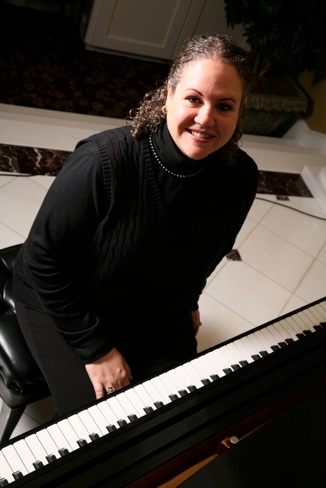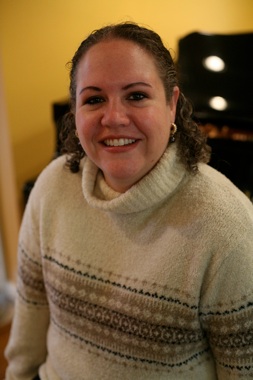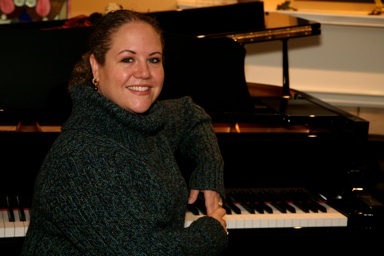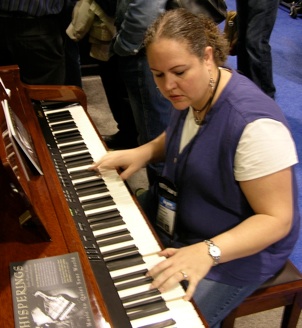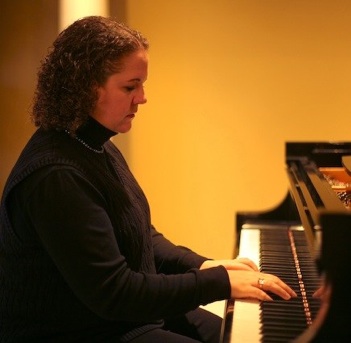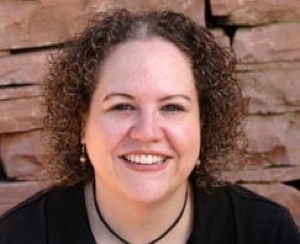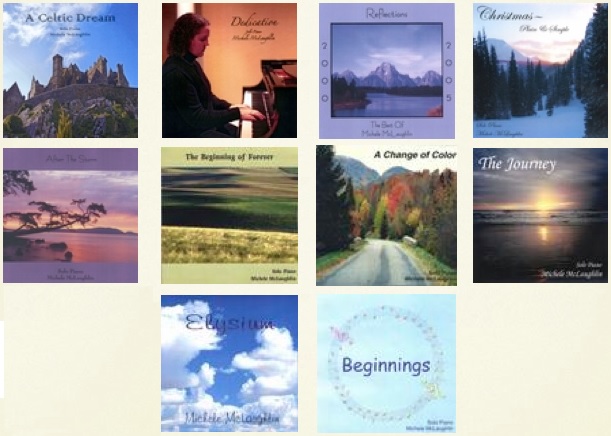One of the most profound ironies of being an artist is that it is often life’s most difficult events that allow an artist to produce his or her best work. This is especially true for an artist who expresses deep emotions with his or her chosen art form. A perfect example of this is Michele McLaughlin’s latest release,
Out of the Darkness, which chronicles the breakup of her marriage and the journey through the divorce process and eventually to happiness. Michele had already produced an impressive collection of ten CDs before
Out of the Darkness, but this new album is stunning. In this candid interview, we talk about the album and the events leading up to it as well as Michele’s early life and her career so far.
KP: Hey Michele! How is everything in Salt Lake City today?
MM: Hi Kathy! It's a beautiful day in Salt Lake today. Spring is finally overtaking winter here and I'm finally getting to enjoy the sunshine.
KP: I’m jealous! We’re still getting a lot of rain! You recently released your eleventh album, Out of the Darkness, which I think is by far your best work to date. I know it’s early, but how is the album doing so far?
MM: I have been so overjoyed by the positive reaction I'm receiving from so many people on this album. Orders have been on the rise, but above that, the compliments have been amazing and that alone is such a blessing.
KP: Going back through the CDs of your music that I’ve reviewed, it seems like all of them have been inspired by significant events in your life. Is this a correct assumption on my part? If so, has that been true for all eleven of your albums?
MM: It is definitely true for most of my music. A lot of my albums have a theme behind them. The Journey is about my path into motherhood; The Beginning of Forever is about finding love; Dedication is about being grateful to the people, places and things I hold dear; A Celtic Dream is about an amazing experience in Ireland that I had; and Out of the Darkness is about my journey to healing after a difficult loss. I find that the music I write usually speaks to the events that have surrounded me during that time, so when it comes time to put an album together, the music usually tells a story and I try to release the album with the theme behind that story.
KP: Let’s talk a bit about the inspiration for the music on Out of the Darkness.
MM: It's funny because during the whole process of going through the breakup and divorce, I didn't feel inspired at all. In a lot of ways, I didn't love my piano anymore, and the music I was creating didn't feel release-worthy. In fact, at first I had no intention of releasing this music because I didn't feel it was good enough to share. I had actually started the year off intending to release another Christmas album, but as I continued to compose and release my emotions through the music I was creating, and as I started to heal and find happiness again, the music started speaking to me and that's when I began to feel inspired again.
KP: It’s interesting how often artists dislike their best work while they are in the process of creating it, and then over time, they realize it’s very special. Did you compose the music during the process of getting through and beyond the crisis of the breakup and divorce or did you write the music after the fact to describe how you felt at the various stages of despair, acceptance, and moving on?
MM: I composed all the music on this album as I was experiencing this journey. Even though I wasn't in love with playing during those first several months, I still played and created because I can’t just stay away from my piano - that would be sad. The music, really, is an audible diary of my experience.
KP: Does the music appear on the CD in the order that you composed the pieces?
MM: Yes, with the exception of “So Long Mr. Selfish.” That song was composed early on; around the same time I wrote “Forsaken” and “The Descent.” When I put the album together, I wanted to keep the music in the order that I wrote it because it tells a story of the journey from suffering to happiness and I think the music really conveys that story in a true light.
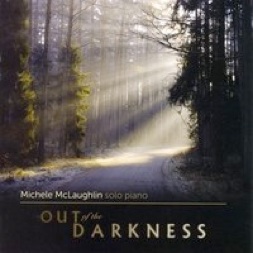
Click the album cover to read Kathy's review.
KP: I agree. There is such a mix of emotions while going through an emotional trauma like that (I’ve been through it twice), and you expressed that point so well in the music. As you said in the liner notes, even though you have accepted the loss and resolved to move on, there are painful obstacles that knock you down for a very long time. Did composing this music help you to get past those obstacles?
MM: In a way, yes. My obstacles have everything to do with my own internal struggles, and playing the piano helps me sort through those, allows me time to clear my mind, and gives me a bit of an emotional break. It's one of the reasons why I didn't stop playing altogether during this time, even though I had many days when I didn't feel like playing at all. I express myself at such a raw level with music, and usually it's not intentional. I don't sit down and say, "Today I'm going to write a happy song" or "Today I'm going to write a sad song". Usually it just happens based on my mood of the moment.
KP: Was playing the piano an emotional refuge while you were going through the healing process?
MM: Absolutely. When I would feel down or in the mood to just clear my mind for a while and forget about everything that was happening, I would sit down and play. There were days I would sit down at the piano for hours and just let it all out.
KP: I would imagine that writing and playing “So Long Mr. Selfish” was and is tremendously cathartic. You mentioned that when you started composing this piece, it was suggested that it be an “angry” song. How did you go from venting your anger to pushing it over the top to more of an expression of “good riddance”?
MM: It's funny, Jennifer Thomas and I were talking one day and I was telling her how I didn't love playing anymore and I was just mad. She said I should write an "angry song" to help release some of my feelings. We call my piano "the beef" because she loves how beefy it is in sound, so at that time I joked about not wanting to write an angry song because I was afraid I'd "injure the beef.” We laughed and she said I should give it a try anyway, so later on I sat down with the intent to write an angry song. The bulk of “So Long Mr. Selfish” was written in one sitting, and the anger part of it started with the bass line, which to me sounded intense and threatening, but the minute I tried adding the melody, it turned into this comical, snide, Broadway'ish style of song. Even when I tried to deviate from that and bring it back to a darker level, it just didn't feel right so I stayed with the comical style.
KP: You obviously really enjoy this piece because it appears about halfway into the album as a piano solo and then again at the end as an orchestrated bonus track. Is it now one of your favorite compositions?
MM: It is! It's a very fun song to play, and when I play it I feel like I’ve released some energy, whether good or bad, and I always feel somewhat refreshed after playing it. I also love it because every time I play it, it makes me smile. It has a catchy tune that sticks in my head for a long time after playing it as well. I wanted to put an orchestrated version of the song on the album and I asked my friend Glen Gabriel if he would like to work on it with me. Glen's music really speaks to me and paints such vivid pictures when I listen to it, and I knew he'd be able to take the song to a level of storytelling that I wouldn't be able to do with just the solo piano version. I wanted the listener to be able to hear the song in its original format, as I had written it, but then be able to experience it again with a much larger palette of colors to convey the true emotion behind the song. I think Glen captured it brilliantly.
KP: Both versions are incredible! Have you performed “Mr. Selfish” for a live audience yet? If so, what was the reaction?
MM: I haven't performed it in concert yet, but I have played it for lots of friends and family, and little gatherings at my house. The reaction is always laughter and smiles and "that was awesome" or "I loved that!" kinds of comments.
KP: That was my reaction, too! I can really imagine it in a movie as a villain’s theme! Have you had a reaction to the album from your ex?
MM: I don't have contact with him at all, so I'm not sure if he's heard it, or even knows I've released it. I did play the song for him though, way back before we had said our final goodbyes, at the point where things started to turn ugly. I played the song for him before telling him the title or story behind the song, and his reaction was the same as others, saying he thought it was awesome. Of course, when I told him the name of the song and that it was written to say "good riddance" to him, he didn't find that very amusing.
KP: Ha ha! I’m really impressed with how strong the whole album is. There isn’t a weak track at all. What are some of your other favorites on the album?
MM: I really love the title track, "Out of the Darkness." "Finding Solace in Friends" is another favorite because it reminds me of some of the happiest days I experienced during the summer after my divorce. I also love "In The Stillness of Peace" and "Rejoice." “Forsaken” is also a favorite because I connect so emotionally to that song. Really though, I have such a connection to every song on the album that I can honestly say they're all my favorites.
KP: Are you going to release sheet music for the album as well? I’d like to be first in line! =)
MM: I already have and the sheet music is available on my website. I wanted to release the album and the sheet music at the same time, so I hired Rebecca Oswald right after I got the masters from the studio. She's so fast she had them back to me in a couple of weeks.
KP: Rebecca is amazing! On some of your earlier albums, it seemed like your left hand ended up being too repetitive at times. You have apparently totally conquered that with this new album. What did you do to make your left hand more versatile?
MM: You were the main inspiration for trying to move away from that repetitive left hand. After talking with you about it after I released A Celtic Dream, I wanted to evolve and improve. Around that same time, David Nevue offered some of his thoughts as well, stating that I should try to add more dynamics to my compositions. Being a self-taught pianist, I really feel limited because I don't have training, and I can't read music, so I'm often playing what feels right rather than paying attention to what my hands are doing. I did the same thing here - I just played what felt right, but I kept a conscious view on the repetition and the dynamics and tried to present something that was better than I had presented before.
KP: Brava! You mentioned a while back that one of your dreams was to be a full-time musician. Have you been able to do that as a single mom?
MM: I was fortunate to be able to move into full-time musician status in June of 2007, shortly after I got married. I was really worried after my divorce that I'd have to go back to work to make ends meet, but I've been blessed to be able to make it work without having to have another job. So for the time being, I get to keep living my dream of working on my music full-time at home, and being an at-home mom to Brandon, which is so important at this critical time in his life.
KP: That’s great! Let’s backtrack a bit now. When did you start playing the piano?
MM: Kindergarten is my earliest memory of playing piano. I know I played before that, but I remember singing songs in kindergarten and then going home and playing those songs by ear. I would come back and play them for the class for show-n-tell. I've always been drawn to pianos, and I've always loved playing.
KP: I know you took piano lessons for a very short time. When was that and why did you quit?
MM: My mom started me in lessons when I was in 2nd grade and I remember hating it. It took all the fun out of playing and made it more like having to do chores. Lessons were like work and I correlated the piano with fun, so I told my mom that I didn't want to take lessons anymore. She didn't force me to continue, although sometimes I wish she had because it would be nice to read music. I suppose I could learn now as an adult, but I just haven't taken that step yet.
KP: Hey! I know someone who teaches piano lessons online! =) I have a lot of fun with my students and never want playing the piano to be a chore. It takes self-discipline, but it should be fun, too! When did you start composing?
MM: I was eight years old. My parents took me to a George Winston concert and we were pretty close to the stage. I remember watching him intently the entire concert, observing his hands, taking in his compositions. He completely captivated me. After that, I started playing his songs by ear. I'd listen to them over and over, and then learn to play them as best I could. It was soon after that I started writing my own songs. I would record them with a tape recorder sitting on top of the piano. I still have those tapes.
KP: Are any other members of your family musicians?
MM: I have several musicians in my family. My Uncle Bill is a fabulous drummer. He's been in bands for as long as I can remember and he's really an amazing musician. He is another big influence on me musically. My Uncle Larry is one of the best guitarists I've ever heard. He's been in several bands and has released many albums. Several of my cousins play instruments as well.
KP: Family get-togethers must be a blast! Is Brandon showing any interest in music?
MM: He does to a degree. He took violin lessons in school as part of 5th grade and he was really good, but when 6th grade came, he signed up for flute. I had hoped he'd stick with the violin, but I didn't force him. He has a musical ear, and will tinker around with songs on my piano, but when I ask him if he wants to start lessons, he tells me no. He loves to play around with the loops on Garageband and will create some great songs with that program.
KP: How old is he now?
MM: He just turned 13 last month, 7th grade. Entering into the realm of teenage-hood has been an interesting ride for sure.
KP: Ooh – you’re just getting started! Who and what are your strongest musical influences?
MM: George Winston would be the first, as well as Mannheim Steamroller. I've been moved by their music since early childhood. Later on, when I started really composing full-time instead of playing by ear, Jim Brickman, Paul Cardall and David Nevue played huge roles in my inspiration. Every one of them has touched me musically for years. Ben Folds, Missy Higgins, Joshua Radin, Tori Amos, Indigo Girls and Sarah McLachlan have all been inspiring in terms of performance, songwriting and talent. Watching them onstage always gets me motivated to write more music and perform for audiences of my own. Lately, I've wanted to broaden my horizons and get into composing with orchestration. Glen Gabriel, Jennifer Thomas and Jace Vek have all been amazing influences in terms of orchestration and film composing. Enya, Secret Garden, Ray Lynch, Gnomusy, Loreena McKinnett and Delirium have inspired me as well.
KP: That’s quite a varied group of influences! What has been your most exciting or most moving musical experience or moment so far?
MM: The entire evolution of my musical journey has been such a fantastic ride. I used to be so shy and reserved about my music - I never used to share it with anyone but my sister and my parents. I felt embarrassed about my playing and had some pretty irrational fears of sharing my music with people. Then one day, my birth mother gave me some grief about making her a tape and at that point I decided that if I was going to make a tape for her, I’d make one for my friends and family as well.
In the fall of 2000, I borrowed my aunt’s Clavinova and recorded twenty of my compositions with a tape recorder, titled it
Beginnings, and shared it with a small group of friends and family. I was overwhelmed by the positive response I received from everyone, their surprise that I hadn’t done more with my music, and their encouragement to continue sharing it with the world. It was a huge eye opener for me and really was the pivotal moment that started me on this journey. I ended up buying my own Clavinova, and in a period of a few months, I recorded and released my next album,
Elysium in 2001. The response I received from that album was amazing and I decided I would compose and release an album every year to give to friends and family as gifts for Christmas.
I released
The Journey in 2002 and
A Change of Color in 2003. It was during that time that I discovered mp3.com and the music of David Nevue. I found a great deal of inspiration from an article I read in the indie Bible that David had written about promoting music on the internet, so I signed up with mp3.com and started promoting my music in a whole new way. One of the biggest and happiest moments was in 2004 when I heard my music from
A Change of Color on MusicChoice Soundscapes. I remember being so excited that I danced around my living room in celebration. I really felt like I had accomplished something great by being a part of the Soundscapes broadcast.
A couple of years later, I sent a few of my albums to David to hopefully be included in his online broadcast, “Whisperings Solo Piano Radio.” He initially declined because of the digital recording on my Clavinova and encouraged me to record in the studio on an acoustic grand. Until that point, I had been afraid to record in the studio because of the time and cost, and because I didn’t feel comfortable recording live and not being able to edit the MIDI files like I could with a digital. I knew, though, that I needed to take that step if I was going to be serious about moving forward with my music, so I put together a “Best Of Michele McLaughlin” album, recorded it in an affordable studio I found in my area, and resubmitted it to David. Shortly afterward, I was welcomed as a new artist to the Whisperings family.
I would have to say that being a part of Whisperings is the biggest foundation for where I am today in my career. Up to that point, I had been a solo entity, trying to learn and grow on my own with limited resources or support. The Whisperings community opened a door so magical for me. I participated in group discussions and started making friends with musicians I had admired for years. It was then that I met Gary Girouard. He was in Salt Lake for a music teachers conference and invited me to guest perform at his concert. I was absolutely terrified and almost told him no, but there was something inside of me that urged me to say yes, so I accepted, and in May 2007 I performed for the second time in my life. I felt such an exhilarating high after that performance and I couldn’t wait to do it again.
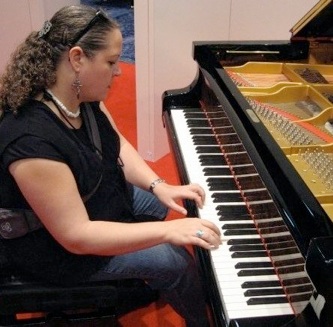
Since that experience three years ago, I have performed in ten concerts with eleven of my musical colleagues and friends and I am working as a full time musician selling music to people all over the world. I would never have believed it back in 2000 when I started this journey. It has truly been a fantastic experience and I am so grateful for all of it.
KP: What a great story! What inspires you to compose?
MM: I love to play and create, and most of my compositions have developed from sessions at the piano just playing and improvising, letting whatever mood I’m in speak through my fingers. If something new catches my ear, I’ll play around with it, record it with my handheld digital recorder so I don’t forget it, and then spend time tweaking it until it feels right. Memories, inspired moments, thoughts - they all play a part in my composing time based on how I’m feeling at that moment. Composing for me is entirely emotion driven.
KP: If you could have any three wishes, what would they be?
MM: To be able to teleport anywhere in the world at any given moment and be able to take people with me so that I could see the world with friends without having to fly/drive to get there; to speak every language in the world fluently; and to be completely healthy and fit without having to work at it.
KP: Is there a particular philosophy you try to convey in your music?
MM: Not so much a philosophy - it’s more of an emotional energy. I try to project that energy through the music so that the listener experiences the music rather than just hearing it. That’s the way I connect to music. For me, it’s an experience, and when I share the music I’ve created, my hope is that the listener will have that same connection.
KP: Is there anything else you’d like to talk about?
MM: Just to thank you for the opportunity to share a little bit about myself with you and say how happy I am that you’ve enjoyed my music. Thanks Kathy!
Many thanks to Michele McLaughlin for taking the time to chat! To learn more about her and to hear samples of her music, please visit
her website, her
Artist Page on MainlyPiano,
iTunes,
Amazon, and
CD Baby.
Kathy Parsons
May 2010

